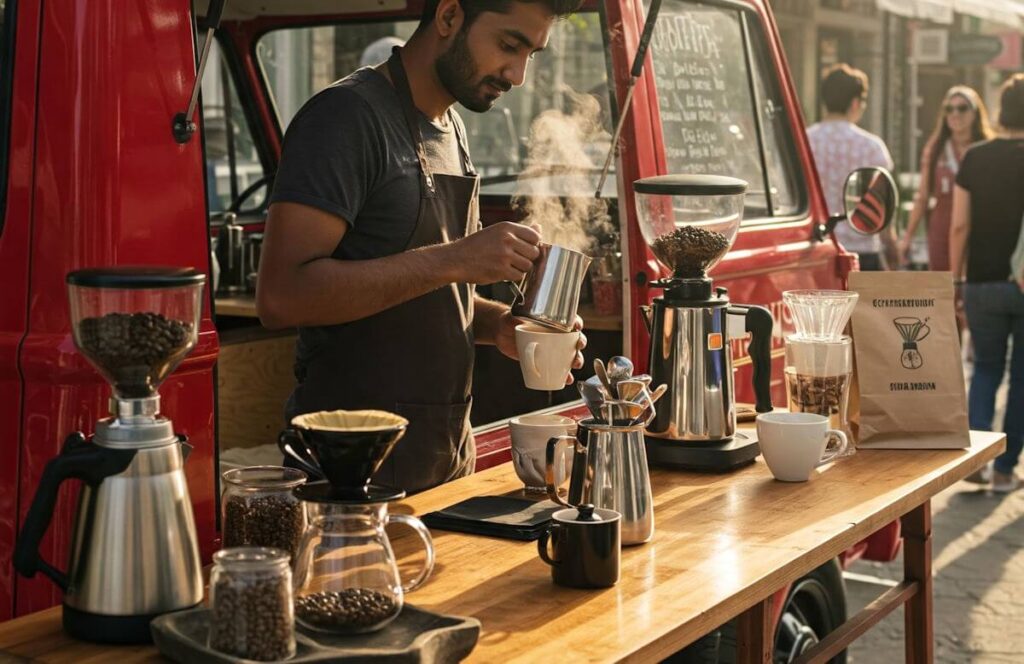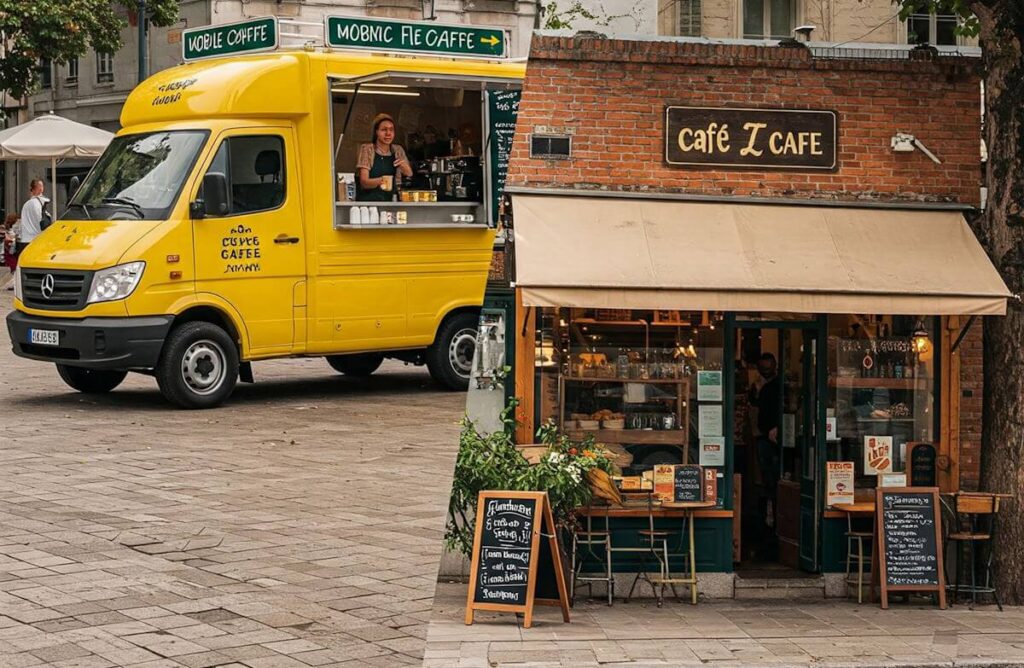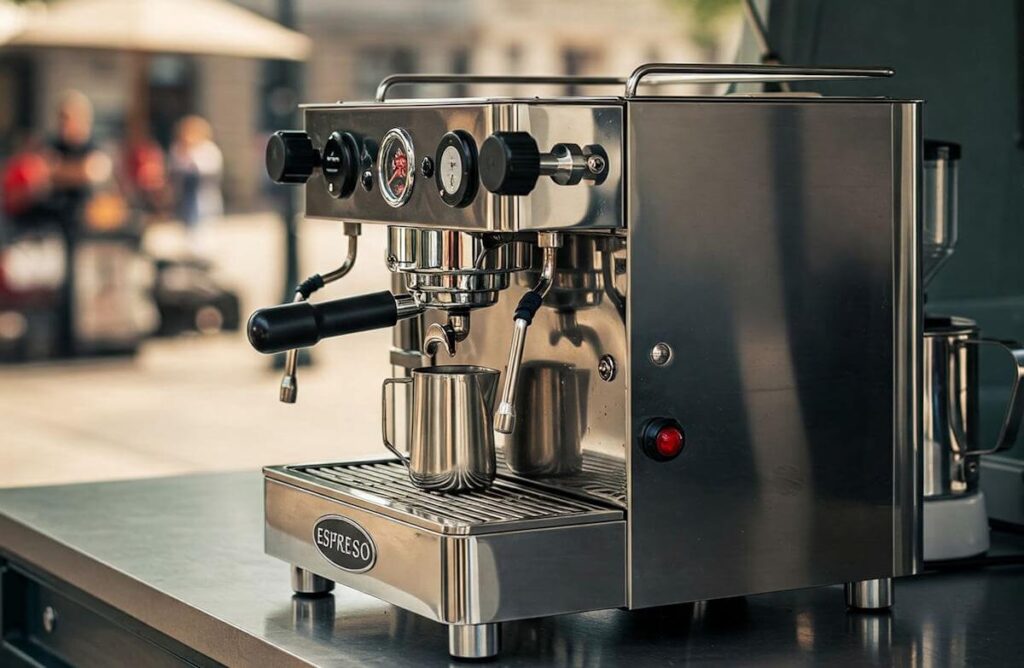Introduction to Mobile Barista Life
The profession of a mobile barista is a dynamic and evolving role that brings the art of coffee brewing to various unique locations. Unlike traditional baristas, who generally work in fixed coffee shops, mobile baristas operate out of food trucks, pop-up stands, or portable carts, enabling them to serve high-quality coffee to patrons in diverse settings. This flexibility not only allows them access to a broader clientele but also enhances the overall customer experience by creating a coffee presence in unexpected places.
Mobile baristas often cater to events such as weddings, corporate gatherings, and festivals, making each day of work distinct and exciting. The essence of their job lies in their ability to adapt to shifting environments while maintaining consistent beverage quality and excellent customer service. From early morning setups at farmer’s markets to evening service at festive nightlife locales, the mobile barista brings coffee culture directly to the community, fostering connections through the universally loved beverage.
This line of work also involves a strong element of entrepreneurship. Many mobile baristas operate their own businesses, curating their drink menus, sourcing specialty coffee beans, and engaging with customers to build a loyal following. Creativity plays a significant role, as they often experiment with seasonal flavors and choose how to present their offerings. Additionally, they must address the logistical challenges of operating on the go, from managing equipment and supplies to navigating local regulations and permits.
Ultimately, being a mobile barista encapsulates more than just brewing coffee; it represents a lifestyle that values community engagement, mindfulness, and the joy of serving. Through this unique profession, baristas can make a significant impact in the lives of those they serve, one cup at a time.
Starting the Day: Morning Routine
The morning routine of a mobile barista is a crucial aspect of their daily workflow, enabling them to set the stage for a productive day. Early rising is a hallmark of this profession; it typically begins before dawn, allowing ample time to prepare before heading out. Upon waking, a mobile barista often starts with a quick breakfast to fuel their energy, preferably something light but nutritious to ensure they remain alert and focused throughout their busy hours.
Once nourished, attention shifts to the essential coffee equipment. This includes inspecting and cleaning coffee machines, grinders, and other tools of the trade. A well-maintained espresso machine is vital for brewing high-quality coffee, and this task often becomes a meditative routine for baristas. They might spend a few moments ensuring that everything is in optimal working condition, as this directly influences the experience they will provide later in the day.
Selecting the coffee beans is another critical component of the morning routine. Mobile baristas often prioritize freshness and quality by sourcing beans from local roasters. This not only supports local businesses but also creates a unique offering for customers who appreciate artisanal products. Carefully choosing the blend or single-origin beans allows baristas to deliver distinct flavor profiles tailored to specific clientele, enhancing overall satisfaction.
Finally, planning the day’s itinerary is essential. This includes targeting specific locations for service, finalizing appointment schedules, and anticipating customer needs. Some baristas utilize digital tools or apps to monitor social media, ensuring they are aware of events or gatherings that might influence their business that day. In essence, the morning routine of a mobile barista encompasses a harmonious blend of preparation, organization, and skill, all of which are vital in cultivating a successful day on the road.
Setting Up the Mobile Coffee Stand
Setting up a mobile coffee stand is a crucial component of a mobile barista’s daily workflow, as it directly influences the efficiency of service and customer satisfaction. The process begins with selecting a strategic location that attracts foot traffic while adhering to local regulations. Once the site is confirmed, the first task involves unloading equipment from the vehicle. This typically includes a portable espresso machine, grinder, various brewing tools, and a full array of coffee beans and supplies.
As the mobile barista removes equipment from the vehicle, care is taken to handle each item with utmost precision to prevent damage. After unloading, the next step is to determine the best arrangement for the stand. The layout should prioritize functionality and customer accessibility. Setting up the coffee stand often involves placing the espresso machine at the forefront, ensuring that customers can easily engage and see the beverage preparation process. This transparency can enhance the overall experience, making it more inviting for patrons.
Additionally, organizing supplies is imperative for a seamless workflow. Ingredients such as milk, syrups, and assorted flavorings must be readily accessible but also stored safely to maintain freshness. Mobile baristas usually utilize labeled containers to streamline the process of obtaining necessary items quickly. Furthermore, to create an inviting atmosphere, thoughtful placement of signage, decorations, and even ambient music is considered. Such details not only enhance the aesthetic appeal of the stand but also encourage passersby to stop and explore the offerings available. Overall, a well-executed setup can lead to a smoother operation and a more enjoyable experience for customers seeking their daily caffeine fix.
Crafting the Perfect Brew: Coffee Preparation
For a mobile barista, the journey of crafting the perfect brew begins with the selection of high-quality coffee beans. The sourcing process is crucial, as the flavor profiles of different beans can significantly affect the final product. Baristas often choose single-origin beans for their distinctive tastes, ensuring that each cup provides a unique experience. Purchasing beans from reputable suppliers who practice sustainable farming methods not only contributes to superior quality but also supports ethical production practices.
Once the beans are selected, the next step involves grinding them. The grind size plays a pivotal role in the brewing process. A coarser grind is appropriate for methods such as French press, while a finer grind benefits espresso preparation. A consistent grind is essential, as uneven particle sizes can lead to improper extraction, resulting in a less balanced flavor.
Water quality is equally important in the preparation of coffee. Ideally, the water should be filtered to remove impurities and chlorine, which can alter the taste. The temperature of the water should be monitored closely, often between 195°F to 205°F, to ensure optimal extraction of flavors from the coffee grounds.
Brewing techniques vary widely, with each method highlighting different elements of coffee’s flavor profile. Techniques range from traditional espresso making to pour-over methods and cold brews. The artistry of latte art adds another layer to coffee preparation, transforming a simple beverage into a visually appealing creation. Baristas employ techniques such as microfoam pouring to create patterns on the surface of lattes, adding to the aesthetic and experience of the beverage.
Ultimately, the meticulous attention to detail in each stage of coffee preparation not only enhances the flavor but also elevates the overall coffee experience for customers. The dedication to crafting the perfect brew reflects the passion that mobile baristas have for their craft.
Customer Interaction: Building Relationships
For a mobile barista, customer interaction is a pivotal aspect of daily operations, not just a means of serving coffee but an opportunity to forge meaningful relationships. Engaging customers effectively can lead to repeat business and a loyal clientele, which is essential for long-term success in the competitive landscape of mobile coffee service.
One effective approach is to create a welcoming atmosphere at the mobile coffee station. This can be achieved by ensuring that the setup is clean, organized, and visually appealing. Friendly and approachable demeanor plays a key role; a smile and a warm greeting can set a positive tone for the interaction. Personalizing the service, such as remembering regular customers’ names or their favorite orders, fosters a sense of familiarity and community.
Engagement doesn’t stop at serving beverages. Taking the time to converse with customers about their day or any events happening in the vicinity can enhance their overall experience. Asking for feedback on new menu items not only shows customers that their opinions matter, but also opens up avenues for dialogue, allowing baristas to connect on a deeper level. This level of engagement gives customers a sense of ownership and involvement in the service they are receiving.
Additionally, leveraging social media platforms to create a community around the mobile barista service can significantly increase customer interaction. Actively sharing updates, engaging with customer comments, and posting photos of the favorite coffee moments can enhance relationships further. Promotions, customer features, and highlights from local events can create buzz and drive traffic to the mobile setup.
Overall, investing time and effort into building relationships through positive customer interactions can make a significant difference for mobile baristas. A loyal customer base is often the result of these enjoyable and authentic exchanges, highlighting the essential role of customer service in this unique profession.
Time Management on the Go
Time management is a pivotal skill for a mobile barista, who is often required to deliver high-quality beverages swiftly while navigating a variety of challenges inherent to a mobile setup. Effective time management involves coordinating multiple tasks simultaneously, ensuring that orders are fulfilled efficiently without compromising on quality. A successful mobile barista employs several strategies to master time management in their daily workflow.
One key strategy is the meticulous preparation of ingredients and equipment before opening for business. This may involve pre-measuring coffee grounds, preparing milk alternatives, and pre-heating equipment. This advanced preparation not only streamlines the beverage-making process but also significantly reduces wait times for customers. Furthermore, by developing an organized workstation, mobile baristas can easily access tools and ingredients, allowing them to respond quickly to incoming orders.
Another essential aspect of time management is creating a streamlined menu that focuses on popular and in-demand beverages. By limiting the menu to a reasonable number of choices, a mobile barista can minimize decision fatigue for customers while expediting the preparation process. Seasonal specials or limited-time offers can also be introduced to keep the menu fresh and engaging, while still enabling rapid service.
Using technology effectively can greatly enhance time management as well. Many mobile baristas utilize point-of-sale systems that enable quick order-taking and payment processing, thus alleviating potential bottlenecks during peak hours. Additionally, employing a ticketing system for orders allows baristas to prioritize tasks and manage workflow in a more structured manner. Regularly reviewing and adapting these systems ensures that they remain efficient and responsive to a mobile barista’s evolving needs.
In conclusion, efficient time management is fundamental for the success of a mobile barista. By implementing strategic preparation, menu design, and effective use of technology, baristas are better equipped to manage their time while providing exceptional service to their customers.
Challenges Faced: Weather and Location Issues
Operating as a mobile barista involves navigating a variety of challenges that can significantly impact service quality and customer satisfaction. One of the primary hurdles is dealing with inclement weather. Whether it is rain, snow, or extreme heat, adverse weather conditions can deter potential customers from venturing out, leading to fluctuating foot traffic. A mobile barista must be prepared to adapt their operations in response to these environmental factors, potentially affecting the selection of beverages or service delivery methods.
In addition to weather considerations, the mobile barista’s ability to find optimal locations for serving customers is paramount. The success of a mobile coffee venture often hinges on identifying high-traffic areas where potential customers congregate. However, securing these prime locations can be competitive and often requires a combination of research and local knowledge. Various elements come into play, including foot traffic patterns and local events, which can impact business on a daily basis.
Moreover, regulations regarding permits and licensing can vary by location, creating an added layer of complexity for mobile baristas. Some areas may have restrictions that limit where food and beverage vendors can operate, necessitating diligent planning to remain compliant while still meeting customer demand. Balancing these challenges requires flexibility and quick decision-making, ensuring that the mobile barista can effectively respond to changes in both the weather and the chosen location.
Ultimately, overcoming these challenges demands a strategic approach that combines resilience, awareness of environmental factors, and an understanding of local dynamics. By adapting to varied circumstances, mobile baristas can continue to provide high-quality coffee to their clientele, regardless of the obstacles they may encounter on any given day.
End of the Day: Wrapping Up Operations
As the day progresses towards its conclusion, a mobile barista must engage in a series of methodical steps to wrap up operations effectively. The closing procedures are not only essential for maintaining cleanliness and organization but also for ensuring the long-term sustainability of the business. The first task typically involves cleaning the coffee stand, where every surface and piece of equipment must be meticulously wiped down. This process helps in removing any accumulated coffee grounds, milk residues, and spills, thereby promoting hygiene and preventing potential damage to the equipment.
Following the initial cleaning, it is crucial for the barista to pack the equipment carefully. This includes properly stowing away the espresso machine, grinders, and other tools of the trade. Ensuring that each item is secured adequately protects against potential damage during transport and sets the scene for a smoother setup the next day. It is also common practice to double-check inventory levels of essential supplies such as coffee beans, milk, and cups, which allows for efficient planning for the following service.
Reflection plays a significant role at the end of the day. The mobile barista often takes a few moments to assess the overall workflow, noting what went well and identifying areas for improvement. This reflective practice is vital, as it aids in honing skills and enhancing customer service for future events. The barista may jot down thoughts regarding popular drink choices, customer interactions, and any logistical challenges faced, ensuring that lessons learned today contribute to a more effective approach tomorrow. Ultimately, concluding the day on a reflective note helps create a cycle of continuous improvement, which is fundamental in the fast-paced, dynamic environment of mobile coffee service.
Reflecting on the Day: Lessons Learned and Future Goals
The life of a mobile barista is dynamic and filled with unique experiences that offer valuable insights into personal and professional growth. Each day presents a multitude of challenges and opportunities that warrant reflection. Engaging in this reflective practice not only enhances one’s skill set but also contributes to the development of a keen entrepreneurial mindset crucial for success in this profession.
A key lesson that often emerges during daily operations is the importance of adaptability. The mobile barista must be prepared for unexpected occurrences, whether it’s a change in weather, last-minute venue adjustments, or fluctuations in customer preferences. Learning to pivot quickly and effectively allows mobile baristas to serve their clientele with consistency and passion, fostering customer loyalty. Documenting these experiences aids in identifying strategies that can improve service delivery in future engagements.
Moreover, interactions with diverse customers can provide significant learning opportunities. Each conversation serves as a reminder of the importance of communication and customer service. Baristas who reflect on these interactions can better understand customer needs and preferences, tailoring their offerings accordingly. This focus on continuous improvement not only enhances the service experience but also cultivates a loyal customer base.
As mobile baristas reflect on their day, setting achievable goals is equally important. These objectives can range from enhancing skillsets, such as mastering latte art or learning about specialty brews, to improving operational efficiency, like streamlining inventory management. Goal setting establishes a road map for growth and motivates baristas to strive for excellence in their craft.
In conclusion, the daily experiences of a mobile barista yield invaluable lessons and foster personal growth. By embracing reflection and proactively setting goals, mobile baristas can navigate the journey toward continuous improvement and business success, ensuring their passion remains at the forefront of their operations.




